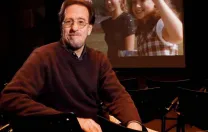“The people I work with here are the filmmakers I respect most in the world. To watch their work evolve and to have them watch my work evolve has been a tremendous asset as a filmmaker,” says Ross McElwee, professor of the practice of filmmaking, whose acclaimed work is credited with popularizing personal documentary (it accounts for 40 to 60 percent of the 500 documentaries submitted annually to the Sundance Film Festival).
For 40 years Robert Gardner directed the Film Study Center, “a place at Harvard where the object is to make significant films,” he says, in the same way that scholars are empowered to make significant books and discoveries. The FSC has assisted numerous faculty documentaries, including his own oeuvre since Dead Birds, such as Rivers of Sand (1974), on Ethiopia’s Hamar people, and Forest of Bliss (1985), about cremation rituals on the Ganges in Benares, which many consider his masterpiece: essayist Eliot Weinberger called it “the most artistically crafted of all ethnographic films.”
Alfred Guzzetti, Hooker professor of visual arts, a student in Gardner’s first Carpenter Center filmmaking class in 1963, is now working on a cycle of experimental videotapes. Guzzetti’s career encompasses his autobiographical trilogy of domestic observation Family Portrait Sittings (1975), Scenes from Childhood (1979), and Beginning Pieces (1986) and political documentaries about the Sandinista revolution in Nicaragua, Living at Risk: The Story of a Nicaraguan Family (1985) and Pictures from a Revolution (1991), both collaborations with his late colleague Richard Rogers and photographer/filmmaker Susan Meiselas, Ed.M. ’71.
Rogers, “one of the most wonderfully gifted teachers of film that Harvard has had,” says Gardner, died in 2001. (He was a senior lecturer in VES.) In addition to the Nicaragua films, Rogers documented New York City painters, as well as poets William Carlos Williams, Wallace Stevens, and others. He made a documentary of A Midwife’s Tale, by Phillips professor of early American history Laurel Thatcher Ulrich (see “A Midwife’s Tale,” November-December 1995, page 12), among other films. His career began with Quarry (1970), about a Quincy, Massachusetts, swimming hole, and included self-portraits such as Elephants (1973), on his alienation from his privileged origins. He was working on Windmill, about his summer community on Long Island, when he died.
In The Tourist (1991), Robb Moss, Arnheim lecturer on filmmaking, juxtaposes encounters he had while shooting films for other directors all around the world with the journey he and his wife made through miscarriage and infertility to the adoption of their daughter. In The Same River Twice (2003), he films five friends during a five-year period as they live their lives and comment on their past as chronicled in River Dogs, his 1982 documentary about 17 friends and lovers rafting through the Grand Canyon.
McElwee has been filming “chapters” from his life in a series of feature-length “home movies,” starting with Sherman’s March: A Meditation on the Possibility of Love in the South during an Era of Nuclear Weapons Proliferation (1988, now on the National Film Registry). He began by emulating cinéma vérité, he says, but was “never entirely comfortable hiding behind the camera all the time, never hearing from ‘me,’” so he adapted what he liked, such as the calm observation of everyday life. In Time Indefinite (1993) he gets married, loses his father, and becomes a father; in Six O’Clock News (1997) he contemplates raising a child in a calamitous world; Bright Leaves (2003) unravels his family’s history in Southern tobacco. McElwee originally wanted to be a writer, and his voiceover narration and on-screen performance combine a photojournalist’s eye with a confessional poet’s “I,” an essayist’s insights, and a comic’s instincts.





